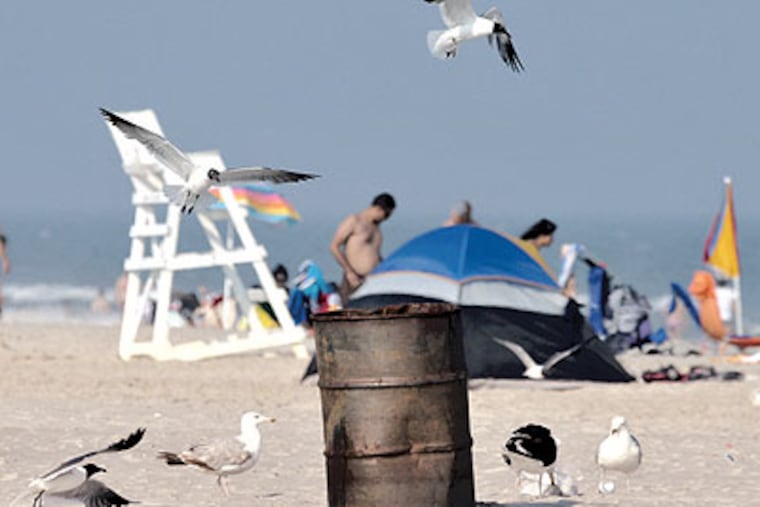PLAYING TAG: Will Wildwood's free beaches soon charge a fee?
WILDWOOD'S wide, windswept beaches have always been free, even if your legs pay a small toll. The kids can get whiny and the beach chairs can dig into sunburned shoulders during that long trek from the boardwalk to the waves, but the surf washes all that away. Wallets, except for what's shelled out for some ice-cream sandwiches, make it through the hot sand unscathed.

WILDWOOD'S wide, windswept beaches have always been free, even if your legs pay a small toll.
The kids can get whiny and the beach chairs can dig into sunburned shoulders during that long trek from the boardwalk to the waves, but the surf washes all that away. Wallets, except for what's shelled out for some ice-cream sandwiches, make it through the hot sand unscathed.
Wildwood's mayor, Ernie Troiano Jr., said that more and more tourists aren't leaving with everything they lugged in, though, and he's wondering whether the city's famed free beaches can afford to be free in the future.
"I think it's inevitable," he said recently of implementing beach tags in Wildwood. "I always swore that God put that beach there for everybody to use, but when you sit on my side of the fence, every single night, it's different."
Wildwood is among the municipalities that make up the Wildwoods, and the towns market their "free" beaches heavily. Collectively, North Wildwood, Wildwood and Wildwood Crest took the top spot in a recent state survey of its best beaches, and none requires beach tags, a rarity at the Jersey shore.
"Are you free this summer?" an announcer asks in a commercial made for the resort. "The Wildwoods are. Free as in free, award-winning beaches that stretch for miles."
Wildwood is also facing serious budget issues, and Troiano, who once looked into closing the city's small high school, said that he has to look at every available source of revenue.
"There's no secret, every community is in financial straits," he said.
Keeping the beaches clean costs the city about $1.5 million per year, Troiano said. Crews are on the beach before sunrise to rake through the sand every morning with machinery, but Troiano said that because so many day-trippers are leaving their garbage behind, it takes longer to clean.
"If everybody picked their trash up at the end of the day, I could probably eliminate four to five people," he said.
Although no "hard plans" have been made, Troiano said that he was looking into how much a beach-tag program, complete with taggers to sell and check for scofflaws, would cost the city. He believed that the program could generate $1 million to $2 million per year. In Ocean City, beach tags brought in approximately $3.4 million in fees last summer, but total operating costs for the beach were about $4 million, said Frank Donato, the city's director of financial management. That gap prompted the city to raise the price of seasonal tags by $5.
Without a beach-tag program to raise funds, Donato said, the brunt of beach costs would fall upon homeowners, not day-trippers and tourists, which is what happens in Wildwood.
"The beaches aren't free; they're being maintained by the property taxes," he said of Wildwood.
And Troiano, who was unseated in a 2009 recall but re-elected earlier this year, thinks that locals are bearing too much of the beach's burden.
"The days of Wildwood carrying the load, of the local taxpayer paying the load, is over," he said.
If beach tags came to Wildwood, the city would lose the $225,000 it receives annually from the Greater Wildwoods Tourism Improvment and Development Authority for beach improvements and maintenance. That group doesn't want anything to change.
"It's one aspect that differentiates us," said executive director John Siciliano. "It is a value for families that come down, that don't have to spend $80 to $100 a week in beach tags."
Although Troiano claims that he's getting good feedback, both Morey's Piers and the Greater Wildwood Hotel and Motel Association are against the idea. Steve Tecco, president of the hotel and motel association, said that guests already pay a 14 percent sales tax on their rooms. Beach tags could just send them elsewhere.
"I'll never question Ernie's heart but on this one, I'll question his head," Tecco said. "We just don't believe it makes sense, and that's C-E-N-T-S."
If everyone thinks, or hopes, that the beach-tag idea is simply a mirage brought on by budget delirium, Troiano suggests picking up a piece of trash on the beach and putting it in a can.
"The way our guests are leaving it, it's disgusting," he said. "Please pick up after yourself. Don't be a pig."